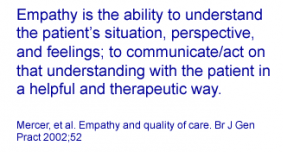March 16th, 2011 by StevenWilkinsMPH in Opinion, Research
3 Comments »

 Is anyone else tired of hearing about how important empathy is in the doctor-patient relationship? Every other day it seems a new study is talking about the therapeutic value of empathy. Enough already!
Is anyone else tired of hearing about how important empathy is in the doctor-patient relationship? Every other day it seems a new study is talking about the therapeutic value of empathy. Enough already!
It’s not that I don’t believe that empathy is important — I do. I also believe the data that links physician empathy with improved patient outcomes, increased satisfaction, and better patient experiences.
A recent study released in Academic Medicine reported that “patients of physicians with high empathy scores were significantly more likely to have good control over their blood sugar as well as cholesterol, while the inverse was true for patients of physicians with low scores.”
Findings from this study by Hojat, et al. are consistent with a 2009 study by Rakel, et al. which found that among patients with the common cold, those with physicians displaying high empathy had a significantly shorter duration of illness and trend toward lesser severity of illness and higher levels of immune response compared to those patients whose physician displayed less empathy. Read more »
*This blog post was originally published at Mind The Gap*
December 27th, 2010 by Medgadget in Better Health Network, News, Research
No Comments »

 Miguel Bruns Alonso, a graduate student at Delft University of Technology in The Netherlands, has developed a pen that detects how much twitching and twirling it’s being put through.
Miguel Bruns Alonso, a graduate student at Delft University of Technology in The Netherlands, has developed a pen that detects how much twitching and twirling it’s being put through.
People under stress tend to move and shake a pen more than someone who is calm. In order to try to get a therapeutic effect out of the pen, Bruns built in counter motion feedback that makes the pen a bit more difficult to move around. Though initial experiments have shown a marginal benefit, further studies and development may prove the benefit of the technology. From TU Delft:
Bruns, who studies industrial design, carried out various experiments during the course of his research, which showed that people tend to play with their pens in their hands when they are tense. It also seems that when they are encouraged to check these nervous movements, or make more gentle movements, it is possible to gain more control over a situation. “Sensors in a pen could provide an unobtrusive way of measuring stress levels. Giving users the right feedback could then help them deal with their stress in a constructive way,” says Bruns. Read more »
*This blog post was originally published at Medgadget*
 Is anyone else tired of hearing about how important empathy is in the doctor-patient relationship? Every other day it seems a new study is talking about the therapeutic value of empathy. Enough already!
Is anyone else tired of hearing about how important empathy is in the doctor-patient relationship? Every other day it seems a new study is talking about the therapeutic value of empathy. Enough already!



 Miguel Bruns Alonso, a graduate student at Delft University of Technology in The Netherlands, has developed a pen that detects how much twitching and twirling it’s being put through.
Miguel Bruns Alonso, a graduate student at Delft University of Technology in The Netherlands, has developed a pen that detects how much twitching and twirling it’s being put through.







